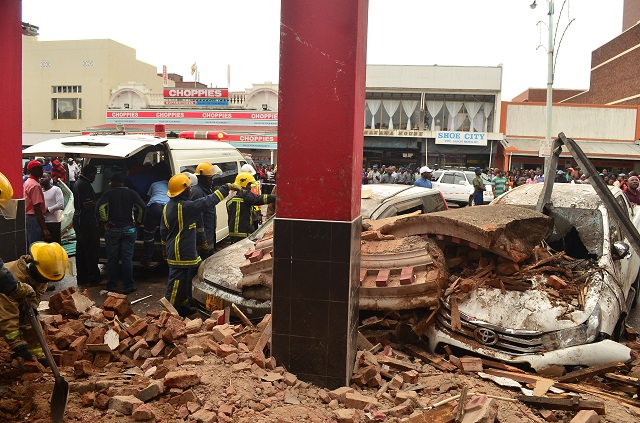Old buildings need regular inspections

Saul Gwakuba Ndlovu
THE collapse of the roof of Bulawayo’s renowned restaurant, Nando’s, leading to the tragic death of one person and serious injury to about four others was a freak of the heavy rains.
The results of that accident could have been far worse as the restaurant would be usually filled with customers at the time it occurred, a Saturday afternoon.
It was by the grace of God that there were only a few people in it on that day, or else it could have been a much worse catastrophe.
The normal reaction to such a happening is to ask three questions:
· What was wrong with the building?
· Who is to blame?
· How will those killed or injured be compensated?
It is obvious that the Nando’s building is quite old and its roof, particularly the timber part, must have been very badly affected by the heavy rains.
It was not probably by sheer luck that the entire roof was not blown off to land on a densely populated place where a much more horrific tragedy could have happened.
The Bulawayo City Council (BCC) and the Nando’s proprietors should have been closely inspecting the building more or less regularly in view of its age.
The BCC should be doing the same to all buildings that are about 60 or more years old.
There are many such structures in the city’s central building district as well as in its immediate environs. Some buildings are much older of course, and need to be thoroughly inspected with the aim of making them much safer and also more aesthetically presentable to the people at large.
We have, in effect, started answering the second question in that while owners of structures in any local government area pay rates to the council, they expect the council to keep an eye on their properties to ensure that they observe acceptable health and safety regulations and standards.
Local government authorities should be very much alive to such practice during times of extra-ordinarily heavy rains or when winter conditions are more severe than usual.
It is a sign of efficiency for a town or city council to employ active health and building inspectors because public safety and health are vital to any community’s existence.
Zimbabwe should avoid terrible incidents such as are more or less regularly experienced in Egypt where buildings collapse now and again, killing and injuring hundreds of people.
Two years or so ago, a church-owned structure in Lagos, Nigeria tumbled down, killing scores of people one of whom was a Zimbabwean.
Such occurrences have seldom, if ever, been experienced in Zimbabwe, and we pray and hope that the Nando’s accident is the first and the last.
Compensating those adversely affected by such incidents may be difficult, impossible or easy depending on whether or not the business or the building is insured.
It is always wise to insure buildings where a large number of people gather for whatever purpose. In fact, the general rule is that every building ought to be insured, particularly those where people congregate for whatever social, political or cultural occasions.
The insurance policy should have a life assurance so that should the business clients or customers be involved in an accident while doing bona fide business in or on the building, due compensation would be automatic, easy and prompt.
Many landlords and landladies, especially in developing countries, tend to attach very little, if any at all, importance to insurance cover for their enterprises, properties or employees, not even for themselves.
The Nando’s incident should serve as a warning to all owners of buildings in every town, particularly old ones. The need to run any business from safe and healthy premises is a fundamental condition for the licensing of every business. The onus is on town, city or rural councils to ensure that premises meet the country’s legal requirements.
Saul Gwakuba Ndlovu is a retired, Bulawayo-based journalist. He can be contacted on cell 0734 328 136 or through email. sgwakuba — @gmail.com











Comments